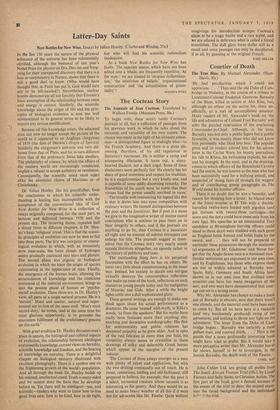Courtier of Death
The True Blue. By Michael Alexander. (Hart- Davis, 30s.)
'HE had peculiarities which I could not appreciate. . . .' Thus said the old Duke of Cam- bridge to Wolseley, in the course of a tribute to Lieutenant-Colonel Frederick Gustavus Burnaby of the Blues, killed in action at Abu Klea, but, although an officer on the active list, there un- officially, as a sort of accomplished amateur. Many readers of Mr. Alexander's book on 'the life and adventures of Colonel Fred Burnaby' will echo the puzzled reservation of the everlasting Commander-in-Chief. Although, in his time, Burnaby was not only a public figure but a public favourite, it was mostly those who did not know him personally who liked him best. The popular press and its readers adored him for his adven- tures in the Carlist Wars, his breezy journalism, his ride to Khiva, his ballooning exploits, his size and his strength. In the mess, and in the drawing- rooms to which officers of the Household Cavalry had the entrée, he was known as the man who had been successfully sued for a bullying assault, and suspected; of 'doing feats of strength for wagers' and of contributing gossip paragraphs to The World about his brother officers.
There is no doubt that he was a bounder, and reason for thinking him a brute : he blazed away at the fuzzy-wuzzies at El Teb with a double- barrelled twelve-bore loaded with pig-shot (and got thirteen with twenty-three cartridges—the score and the story could have come only from his own lips). His speeches as an unsuccessful Tory candidate at Birmingham (serving officers could stand in those days) were studded with such gems as 'England holds Ireland and holds India by the sword, and . . . they will not be prepared to surrender these possessions through the sentimen- tal arguments of Mr. Gladstone' and 'Never for- get that the Anglo-Saxon race is a dominant race.' Similar sentiments are expressed in our own time, and by Englishmen, but those who express them are not so widely admired as Burnaby was : Spain, Italy, Germany and South Africa have shown us in our own time that civilised com- munities can have too many swaggerers of the sort, and two wars have demonstrated that cour- age can serve a wrong cause.
Why Mr. Alexander has chosen to make a book out of Burnaby is obscure, save that there wasn't one already, and the material must have been easy to come by. But all we have here is a readable (and very handsomely produced) string of the adventures, and nothing to throw any light on the adventurer. The letter from the Duke of. Cam- bridge begins : 'Burnaby was certainly a most gallant man, and courted death. • . .' Here is the puzzle that a more profoundly interesting book might have tried to probe. But it would take a more perceptive writer than Mr. Alexander has so far shown himself to be to investigate, in the loutish Burnaby, the death-wish of the Fascist.
CYRIL RAY










































 Previous page
Previous page